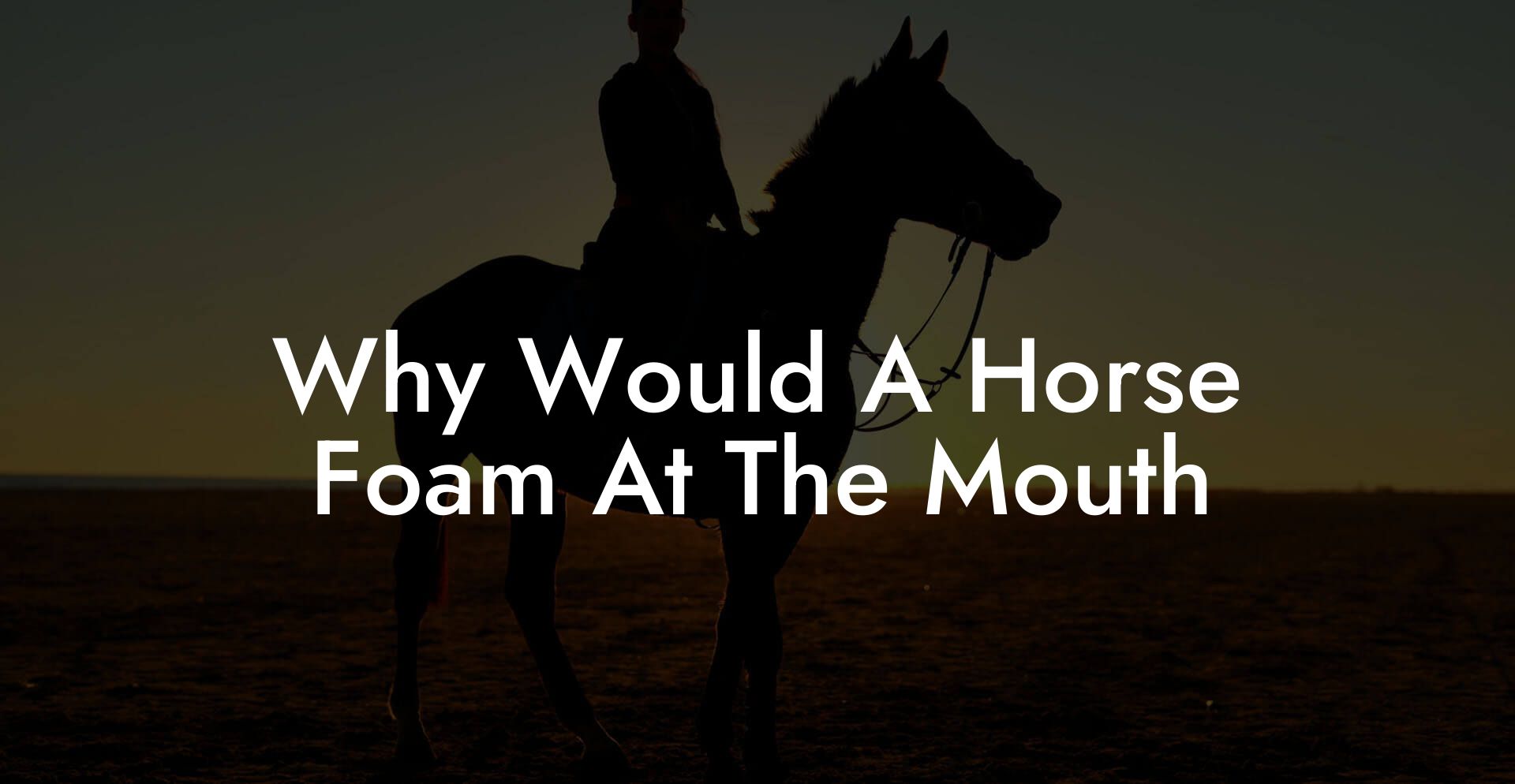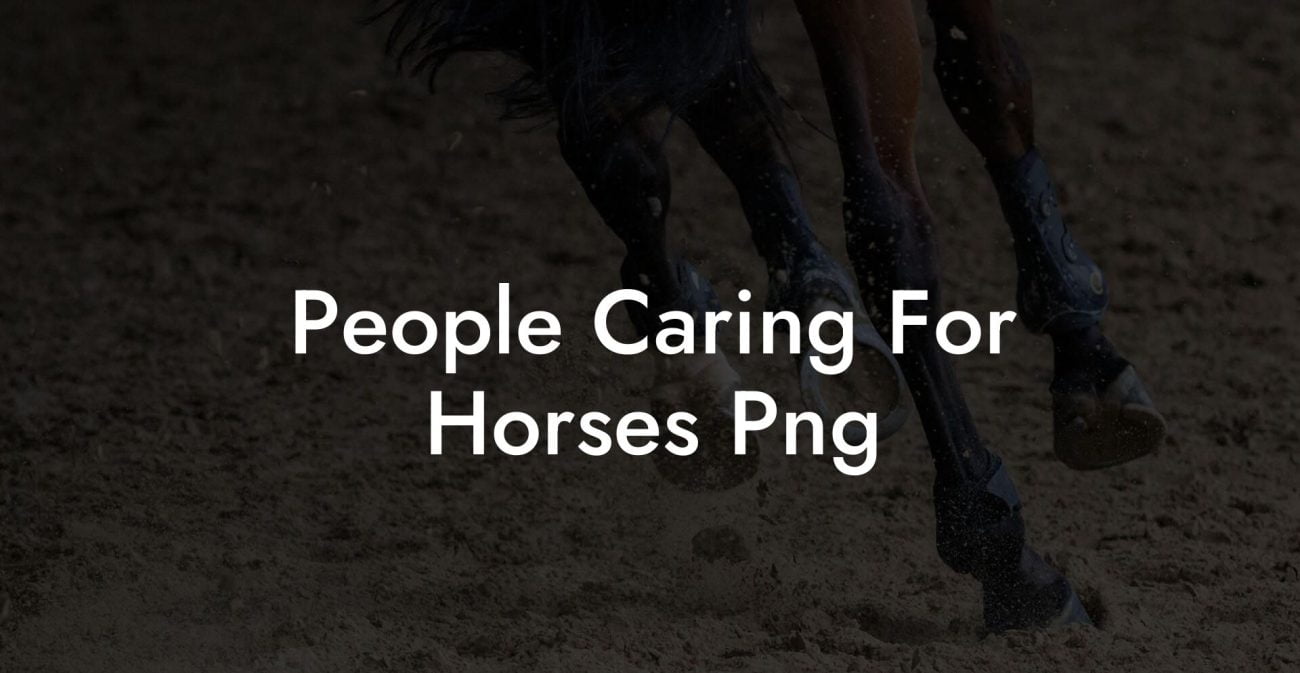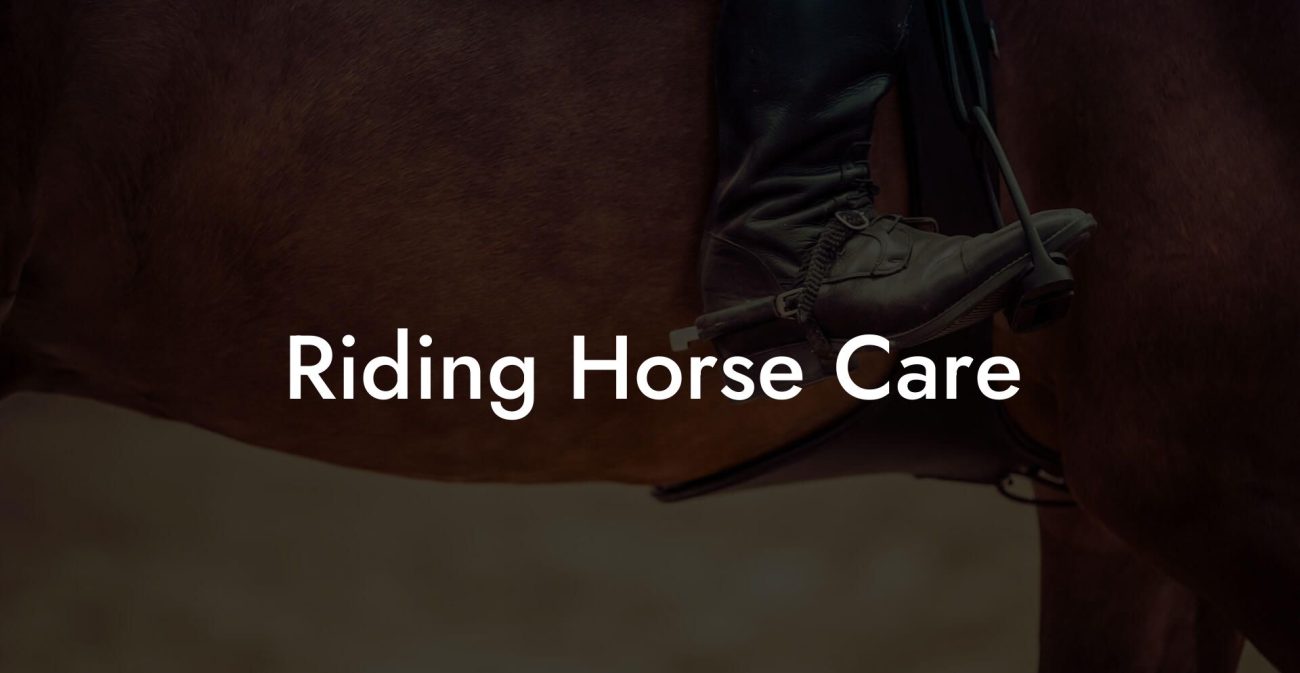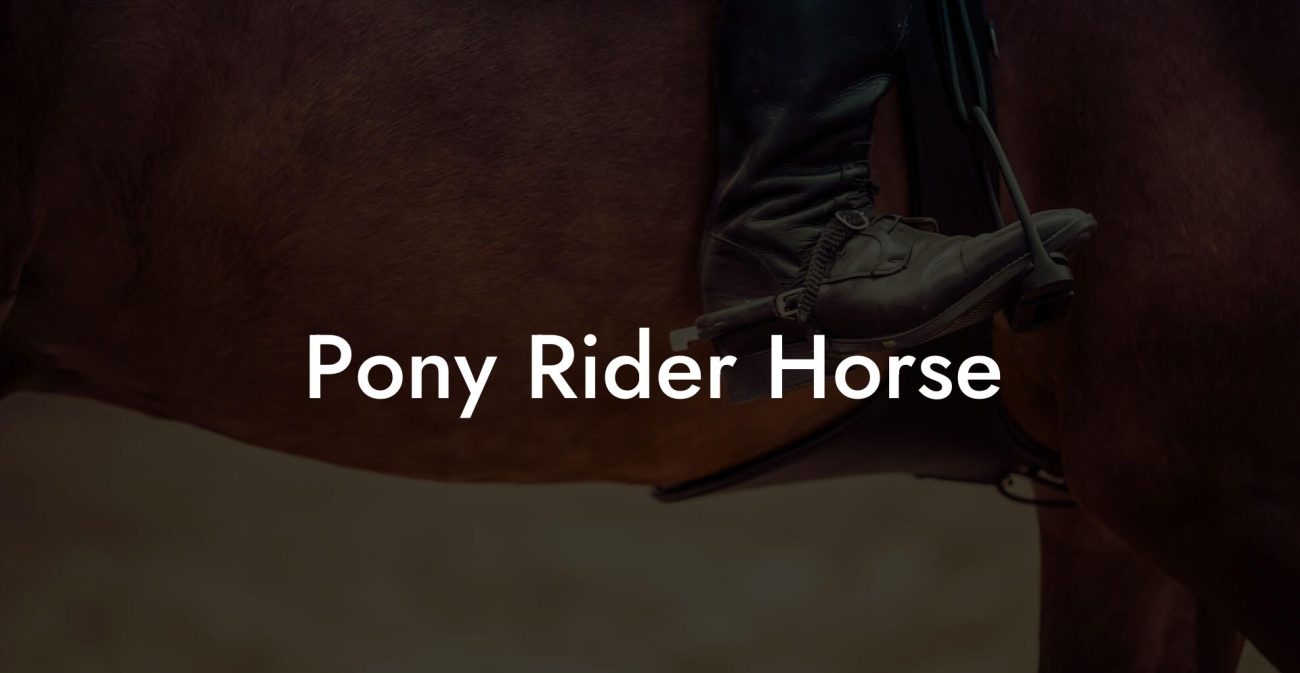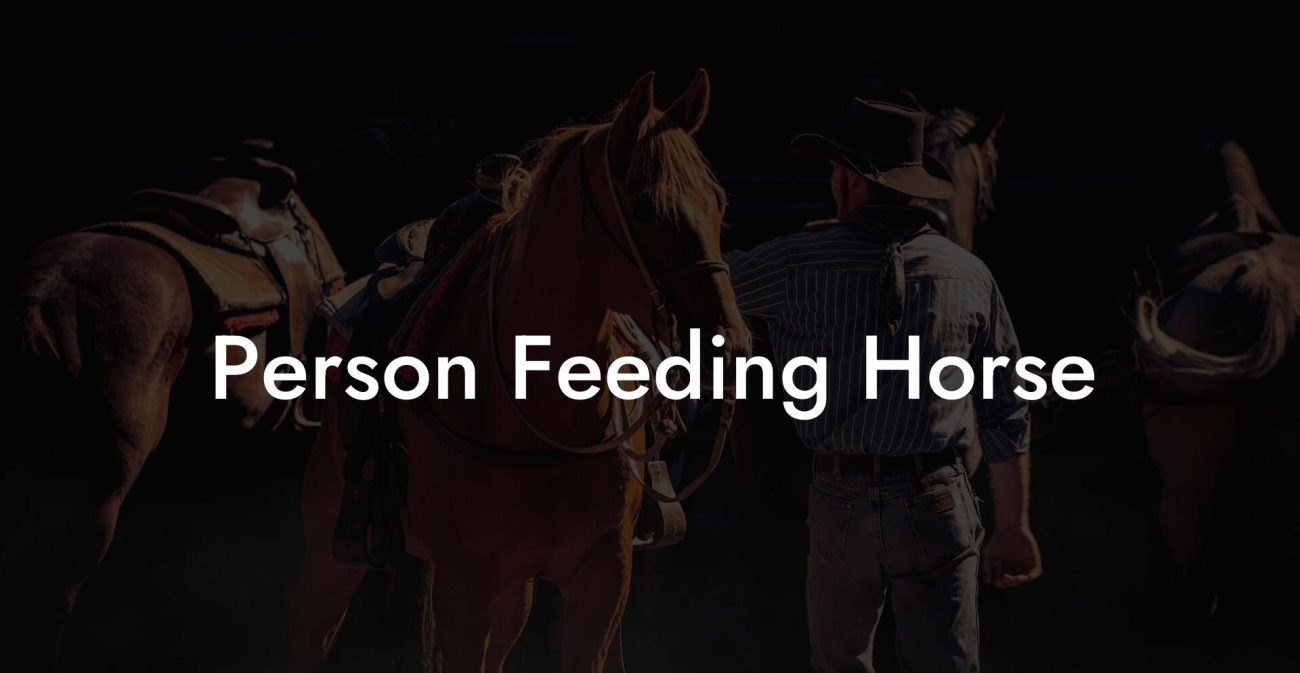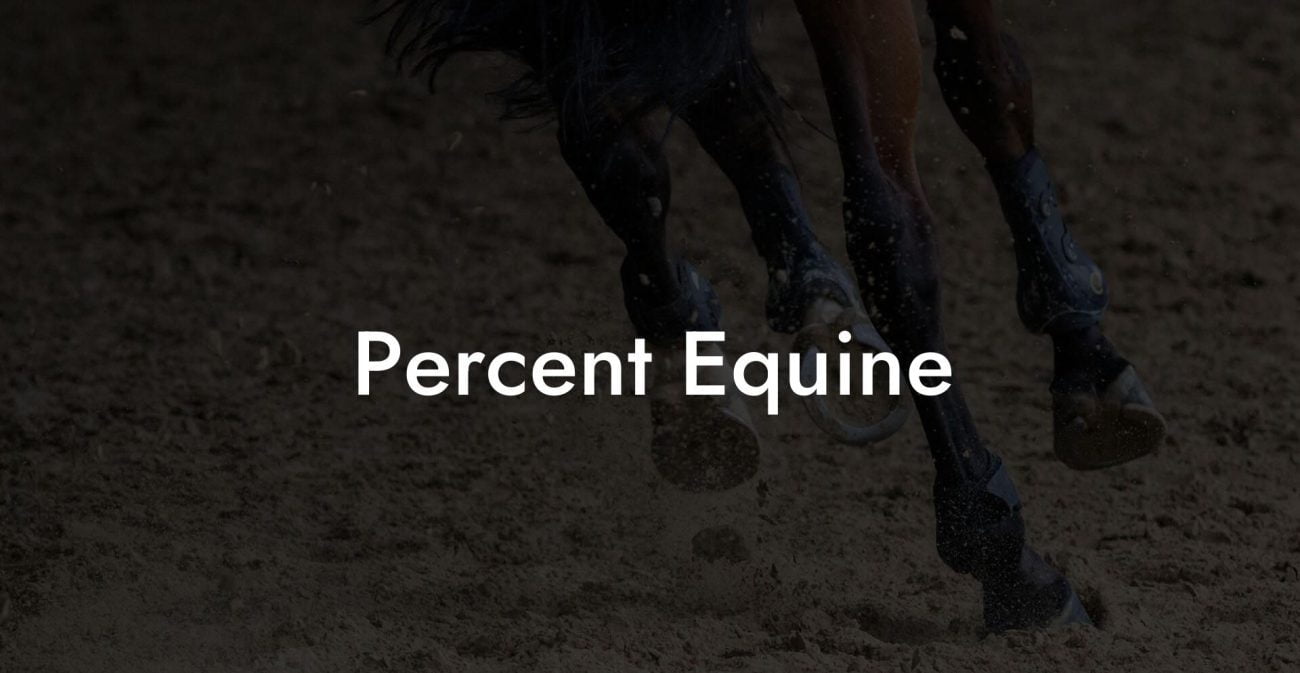Ever caught your horse sporting a frothy smile that seems straight out of a quirky viral video? One minute your four-legged friend is calmly munching hay, and the next, there's a bubbly, foamy spectacle at the mouth that leaves you wondering if your equine companion has discovered a new beauty treatment. Don’t fret, this isn’t the opening scene of a bizarre animated film. Instead, it’s a real-life phenomenon known to many horse owners, and while it might look as if your horse is auditioning for a canine toothpaste commercial, there’s often more to the story than meets the eye.
Quick Links to Useful Sections
- Meet the Foamy Phenomenon: A Closer Look at Your Equine’s Mysterious Saliva Show
- Natural Foaming: When It’s All in the Game
- When Foaming Signals a Problem
- Unwrapping the Mystery: Common Medical Causes of Foaming at the Mouth in Horses
- 1. Colic and Gastrointestinal Distress
- 2. Respiratory Issues and Airway Obstructions
- 3. Dental Problems and Oral Discomfort
- 4. Toxic Ingestion or Chemical Exposure
- 5. Neurological Disorders and Seizures
- Behavioral and Environmental Factors That Contribute to Foaming
- Anxiety and Stress Triggers
- Excitement and Overexertion
- Dietary Influences and Forage Quality
- Environmental Irritants
- How to Assess Foaming: When to Worry and When to Chill
- First Aid and Home Care: What to Do When Foaming Strikes
- Step 1: Calm Observations and Environmental Checks
- Step 2: Examine the Mouth and Surrounding Areas
- Step 3: Adjust Feeding and Hydration Practices
- Step 4: Create a Calm and Clean Environment
- Step 5: Monitor and Document
- When to Call in the Pros: Veterinary Diagnosis and Treatment
- Integrative and Holistic Approaches to Equine Care
- Understanding Your Horse’s Diet and Its Role in Oral Health
- Regular Dental Care: A Key to Preventing Unwanted Foaming
- Environmental Considerations: Creating a Clean, Stress-Reduced Living Space
- Case Studies: Real-Life Stories of Foaming Horses and Their Comebacks
- Case Study 1: The Overenthusiastic Sprinter
- Case Study 2: The Dental Dilemma
- Case Study 3: A Toxic Tasting Mishap
- Resources and Community Support: Your Next Steps in Equine Wellness
- Your Journey to Empowered Equine Health
- Equine Health FAQs
Meet the Foamy Phenomenon: A Closer Look at Your Equine’s Mysterious Saliva Show
When it comes to our beloved horses, unexpected behavior can trigger both amusement and concern. Foaming at the mouth might seem like a quirky quirk at first glance, but discerning whether it’s a harmless side effect of daily activities or a sign of something more serious is key to ensuring your horse’s well-being. Much like a dramatic Instagram reel, every foamy episode tells a story, one that can be a mix of excitement, stress, or an underlying medical issue.
Natural Foaming: When It’s All in the Game
Horses are remarkable creatures with a number of fascinating natural behaviors, and foaming isn’t always a sign of distress. In many cases, you might notice a bit of froth when your horse is:
- Exercising or engaging in intense physical activity, where their increased respiration causes extra salivation.
- Chewing on especially fibrous or moist forage, which can naturally lead to a build-up of saliva that appears foamy.
- Experiencing a moment of excitement or nervousness, yes, even horses have their “oops, did I just overdo it?” moments.
In these instances, the foamy display is typically benign and can be chalked up to normal equine physiology. Just as Gen-Z loves to capture the hype of a spontaneous dance move, your horse might be showing off a quirky side effect of its daily routine.
When Foaming Signals a Problem
However, not all foaming is created equal. While a little froth might be perfectly normal during moments of high exertion, persistent or excessive foaming can be a red flag. It may indicate that your horse is battling an underlying condition that needs attention. The challenge lies in distinguishing between a harmless show and a signal that something is amiss.
Unwrapping the Mystery: Common Medical Causes of Foaming at the Mouth in Horses
Understanding the potential causes behind your horse’s foaming behavior is the first step in ensuring proper care. Let’s dive into some common medical reasons that might prompt this bubbly reaction.
1. Colic and Gastrointestinal Distress
Colic is one of the most serious conditions affecting horses and can sometimes lead to excessive salivation or foaming at the mouth. When a horse is experiencing gastrointestinal distress, it may drool copiously as a response to nausea or pain. If you notice foaming along with signs of abdominal discomfort, restlessness, or decreased appetite, it could be an early warning sign of colic, a condition that demands immediate veterinary attention.
2. Respiratory Issues and Airway Obstructions
The equine respiratory system is finely tuned for high-performance activities, but conditions such as heaves (also known as recurrent airway obstruction) or inhalation of dust and allergens can cause irritation in the respiratory tract. This irritation may lead to increased mucus production and saliva, sometimes manifesting as foam near the mouth. Pay attention if your horse’s foaming is coupled with labored breathing, coughing, or nasal discharge.
3. Dental Problems and Oral Discomfort
Horses have a unique set of dental needs, and neglecting regular dental care can result in issues such as sharp points, uneven wear, or periodontal disease. Oral pain from dental problems can cause a horse to drool excessively, and in some instances, the saliva may appear frothy. Routine dental check-ups can help prevent and manage these issues, ensuring your horse chomps on hay without any discomfort.
4. Toxic Ingestion or Chemical Exposure
Ever wonder what might happen if your horse nibbles on a toxic plant or comes into contact with harmful chemicals? Ingestion of toxic substances can irritate the digestive system and lead to foaming at the mouth as the body reacts to the poison. These scenarios are medical emergencies, and if you suspect your horse has ingested something toxic, you should contact your veterinarian immediately.
5. Neurological Disorders and Seizures
Although less common, certain neurological conditions or even seizures can result in a frothy mouth. Neurological episodes may cause uncontrolled salivation, and in some cases, the appearance of foam. If such symptoms are observed, it’s crucial to seek professional veterinary advice to diagnose and manage the underlying neurological issue.
Behavioral and Environmental Factors That Contribute to Foaming
Not every instance of foamy saliva is the result of a severe medical condition; sometimes, horse behavior and environmental influences play a role. Understanding these factors can help you differentiate between harmless froth and a symptom of distress.
Anxiety and Stress Triggers
Just as we experience butterflies before a big presentation or a first date, horses can also feel the pressure in new or stressful situations. Changes in routine, unfamiliar environments, or even the presence of new animals can trigger anxiety. In such stressful moments, a horse may salivate more than usual, and the resulting foam can be a sign that your equine friend is feeling overwhelmed.
Excitement and Overexertion
If your horse is gearing up for a competition, a spirited run in the paddock, or even an impromptu game of tag with its barn buddies, the increased physical exertion can lead to excess saliva production. When combined with heavy breathing during a workout, this saliva can mix with air to form froth. So, if your horse is sporting a bubbly lip after an energetic romp, it might just be part of its natural athletic performance.
Dietary Influences and Forage Quality
The type and quality of feed your horse consumes can impact salivation. High-moisture forages or particularly fibrous diets may cause an increase in saliva production as the horse chews and processes its food. While a moderate level of frothing is normal after a hearty meal, excessive or abnormal foaming could point to underlying feeding issues or digestive disturbances.
Environmental Irritants
Dust, pollen, and other airborne irritants can wreak havoc on your horse’s respiratory and oral health. Prolonged exposure to such elements may lead to both respiratory discomfort and increased salivation. Ensuring your horse’s stable is well-ventilated and free from excessive dust can help mitigate this risk.
How to Assess Foaming: When to Worry and When to Chill
As a responsible horse owner, it’s important to know when your equine friend’s foaming is nothing more than a minor quirk of nature, versus when it’s a call for urgent care. Here are a few guidelines to help you make that distinction:
- Normal Foaming: Occurs during or immediately following exercise, excitement, or when the horse is grazing on particularly moist or fibrous forage. These instances are typically transient and resolve on their own.
- Concerning Foaming: Persistently frothy saliva that is accompanied by additional symptoms such as labored breathing, reluctance to eat, changes in behavior, signs of pain or discomfort, or sudden onset after a period of normal behavior should be taken seriously.
- Acute Changes: If your horse’s foaming appears abruptly, especially if it’s coupled with symptoms like colic, coughing, or lethargy, it’s time to consult your veterinarian right away.
Remember: when in doubt, it’s always best to err on the side of caution. A timely vet visit can prevent a minor issue from ballooning into a major health emergency.
First Aid and Home Care: What to Do When Foaming Strikes
So, you’ve noticed your horse’s mouth forming a little frothy cloud, and you’re wondering what to do next. While it might be tempting to assume it’s just a quirky habit, there are some proactive steps you can take to ensure your horse stays happy and healthy.
Step 1: Calm Observations and Environmental Checks
Start by staying calm, your horse can pick up on your energy. Monitor your horse closely for any additional signs of distress. Check the surroundings for potential irritants such as:
- Excess dust or strong cleaning chemicals
- Faulty water systems that might be causing contamination
- Recent changes in diet or new feed types
Step 2: Examine the Mouth and Surrounding Areas
Gently inspect your horse’s mouth for any injuries, cuts, or foreign objects that might be causing discomfort. Look for burns from hot feed or residue from chemicals that might be irritating the mucous membranes.
Step 3: Adjust Feeding and Hydration Practices
Ensure that your horse is receiving fresh, clean water and a well-balanced diet. High-quality forage and regular hydration help maintain healthy salivation levels and reduce the risk of digestive or dental issues.
Step 4: Create a Calm and Clean Environment
Reducing stress is key. Create a stable, serene environment free from unnecessary noise and distractions. A well-ventilated, dust-controlled stall can do wonders for both respiratory health and overall comfort.
Step 5: Monitor and Document
Keep a record of your horse’s behavior, including the frequency and context of the foaming episodes. This documentation will be invaluable for your veterinarian to determine if there is an underlying issue or if the foaming is simply a temporary behavioral quirk.
When to Call in the Pros: Veterinary Diagnosis and Treatment
Although many cases of foaming at the mouth are rooted in minor or transient issues, certain scenarios call for professional veterinary intervention. Here’s when you should reach out to your veterinarian:
- Persistent or Severe Foaming: If the foaming doesn’t subside within a few hours or is accompanied by additional concerning symptoms such as severe abdominal pain, labored breathing, or drastic changes in behavior, don’t hesitate to call your vet.
- Signs of Ingestion of a Toxin: Suspected ingestion of spoiled food, toxic plants, or harmful chemicals requires immediate medical evaluation.
- Oral or Dental Issues: Visible signs of dental discomfort or injury should be assessed by a veterinarian, as dental problems can quickly compound other health issues.
Veterinary professionals might perform a range of diagnostic tests including blood work, dental examinations, endoscopy, or imaging studies to pinpoint the source of the problem. Based on their findings, they may recommend treatments ranging from medication and dietary changes to more intensive interventions.
Integrative and Holistic Approaches to Equine Care
In today’s world, horse care is evolving beyond conventional veterinary medicine. Many equine enthusiasts, especially those in the Gen-Z and millennial circles, are embracing holistic and integrative approaches that combine scientific expertise with natural, complementary therapies. These strategies not only address the immediate foaming concern but also promote overall well-being and longevity.
Integrative equine care may include:
- nutrition and Supplementation: Optimizing your horse’s diet with a balanced mix of high-quality forage, grains, and nutritional supplements can play a crucial role in maintaining digestive and oral health.
- Chiropractic and Massage Therapy: Regular chiropractic adjustments and massage therapy can help alleviate physical stress and improve overall mobility, reducing the risk of issues that might indirectly lead to foaming.
- Herbal Remedies: Certain herbs are known to reduce inflammation and support digestive health. Always consult with an equine nutritionist or vet before introducing new supplements.
- Environmental Enrichment: A well-managed living environment with ample space, proper ventilation, and a stress-free atmosphere supports both mental and physical health.
By combining these integrative approaches with conventional veterinary care, you create a robust foundation for your horse’s health that addresses both symptoms and underlying causes. This holistic mindset resonates with today’s care culture, which values balance, transparency, and the fusion of traditional practices with innovative wellness strategies.
Understanding Your Horse’s Diet and Its Role in Oral Health
Diet plays a pivotal role in the overall health of your horse, and it can have a direct impact on why your horse might foam at the mouth. Just as we upgrade our morning smoothie routines to stay fresh and energized, your horse’s diet should be optimized to promote robust oral and gastrointestinal health.
Consider these dietary aspects:
- High-Quality Forage: A steady supply of clean, high-quality hay or pasture is key. Overly wet or moldy forage can irritate the digestive tract, potentially leading to increased salivation and foaming.
- Balanced Grains and Supplements: In moderation, grains can provide essential energy. Be mindful of the balance, too many grains, especially if improperly digested, might cause stomach upset and subsequent foaming.
- Regular Hydration: Clean, fresh water should always be readily available. Proper hydration helps with digestion and reduces the risk of excessive saliva production caused by dry mouth or dehydration.
By tuning in to your horse’s nutritional needs and making adjustments as necessary, you not only improve their overall health but also mitigate risks that might otherwise lead to abnormal foaming.
Regular Dental Care: A Key to Preventing Unwanted Foaming
Just like a good skincare routine, your horse’s dental health is an essential pillar of its overall well-being. Horses’ teeth wear continuously throughout their lives, and without regular dental check-ups and treatments, issues such as sharp edges, dental decay, or misaligned bites can develop.
These dental issues can cause discomfort and lead to excessive drooling or foaming. Routine dental examinations help identify problems early, ensuring that your horse can chew comfortably and efficiently. If you notice signs of excessive licking, head tossing, or reluctance to eat, it’s wise to arrange for a dental check-up as soon as possible.
Environmental Considerations: Creating a Clean, Stress-Reduced Living Space
The environment in which your horse lives can significantly influence its well-being. Dusty or poorly ventilated stables can contribute to respiratory irritation, which in turn might lead to increased salivation and occasional foaming. Managing the stable environment is not just about aesthetics; it’s about crafting a space that minimizes stressors and maximizes health.
Here are a few tips to create an optimal environment:
- Keep Stalls Clean: Regularly clean and maintain stable bedding to reduce dust and allergens.
- Improve Ventilation: A well-ventilated stable helps prevent the buildup of airborne irritants that can affect your horse’s respiratory system.
- Monitor Temperature and Humidity: Extreme temperatures and humidity levels can stress your horse. Aim for a stable environment that is comfortable year-round.
- Manage Pollen and Mold: In seasons where allergens are rampant, extra measures such as air purifiers or more frequent cleaning may be beneficial.
By taking proactive steps to improve your horse’s environment, you reduce the likelihood of health issues that could manifest as persistent or concerning foaming.
Case Studies: Real-Life Stories of Foaming Horses and Their Comebacks
Sometimes the best way to understand a veterinary mystery is to look at it through the lens of real-life experiences. Here are a few case studies that illustrate a range of scenarios involving horses that started foaming at the mouth, and how attentive care made all the difference.
Case Study 1: The Overenthusiastic Sprinter
Bella, a spirited Thoroughbred with a passion for speed, was known for her energetic runs on the track. After a particularly intense workout, her owner noticed a moderate amount of froth at her mouth. Recognizing that this was likely a normal response to heavy exertion, they ensured Bella was given proper cool-down time, abundant water, and a nutritious post-workout snack. With these adjustments, Bella continued to perform at her peak while her foaming episodes remained a temporary, post-race phenomenon.
Case Study 2: The Dental Dilemma
Charlie, a gentle gelding with a calm demeanor, started to show signs of discomfort while eating. His owner observed that he was drooling excessively, and the drool occasionally mixed with foam. A visit to the equine dentist revealed that Charlie had several dental issues, including uneven wear and sharp points that were causing pain. After a dental treatment and regular follow-up care, Charlie’s oral discomfort was alleviated, and his foaming episodes stopped. This case underscores the importance of routine dental care in preventing unwanted oral symptoms.
Case Study 3: A Toxic Tasting Mishap
In a small barn nestled in the countryside, Daisy, a playful mare, inadvertently ingested a batch of moldy hay contaminated with toxic fungi. Shortly after, she began foaming at the mouth and exhibiting signs of gastrointestinal distress. Recognizing the severity of the situation, her owner called the veterinarian immediately. Following intensive treatment, including detoxification and supportive care, Daisy made a full recovery. Daisy’s story highlights the critical role of feed quality and the importance of swift veterinary intervention when toxic ingestion is suspected.
Resources and Community Support: Your Next Steps in Equine Wellness
Caring for a horse is an evolving journey filled with surprises, learning curves, and unique challenges. Whether you’re a seasoned equestrian or a newbie navigating your first foamy-mouthed incident, tapping into a community of fellow horse lovers can provide invaluable support.
Here are some ways to expand your equine knowledge and support network:
- Online Forums and Social Media Groups: Platforms such as Facebook, Reddit, and dedicated equine communities offer a place to share experiences, ask questions, and gain insights from other horse owners.
- Local Equine Clubs and riding Stables: In-person gatherings, workshops, and riding sessions can foster lasting relationships and provide hands-on learning, especially when dealing with common health concerns like foaming at the mouth.
- Consultation with Equine Specialists: Don’t hesitate to seek advice from veterinarians, equine nutritionists, and dental specialists. Many experts offer online consultations and are more than happy to share their wisdom.
- Continuing Education: Numerous online courses and webinars focus on equine care, covering topics from dental health to holistic therapies, ideal for the tech-savvy millennial and Gen-Z horse caretaker.
- Local Feed and Supply Stores: Often a hub for community gatherings, these stores can provide advice on everything from high-quality forage to advanced care techniques, as well as brochures and literature on horse health.
By engaging with these resources, you’re not just addressing the immediate concern of foaming at the mouth, you’re building a long-term support system geared towards proactive equine wellness. Knowledge is power, and connecting with others in the equine care community can empower you to make informed, confident decisions in your horse’s best interest.
Your Journey to Empowered Equine Health
The sight of your horse foaming at the mouth might initially spark panic or confusion, but remember, it’s only one chapter in the vibrant story of equine care. By understanding the various causes, whether it’s a byproduct of excitement, a response to strenuous exercise, or an indicator of an underlying health issue, you can take thoughtful steps to ensure your horse’s continued well-being.
Every horse is unique, and so is every case of foaming. As you embark on your journey from uncertainty to assured care, keep in mind that the balance between traditional veterinary diagnosis and innovative, integrative care is what truly sets the stage for optimal equine health.
Embrace the process of learning, adapting, and engaging with the equine community. With every new piece of knowledge and every shared experience, you’re not only enhancing your horse’s life, you’re also contributing to a broader culture of compassion, education, and proactive care that defines modern horse ownership.
So next time you spot a little froth at your horse’s mouth, take a deep breath, observe carefully, and decide whether it’s a moment of natural behavior or a call for deeper attention. Your vigilance, combined with sound advice and a touch of holistic care, will pave the way for many more healthy, happy rides together.
Equine Health FAQs
Below is a list of frequently asked questions that address common concerns about why horses might foam at the mouth, along with practical insights and advice for owners.
1. Why does my horse sometimes foam at the mouth?
Foaming at the mouth can be due to a variety of reasons, including natural responses to vigorous exercise, excessive salivation while eating fibrous or moist forage, and moments of excitement or anxiety. However, persistent or excessive foaming may indicate underlying medical or dental issues.
2. When should I be concerned about the foaming?
If the foaming is accompanied by other symptoms such as labored breathing, signs of pain (like pawing or restlessness), changes in eating habits, or general lethargy, it is wise to consult with a veterinarian immediately.
3. Could dental problems cause my horse to foam at the mouth?
Yes, dental issues such as sharp edges or decay can cause discomfort while chewing, leading to excessive salivation and foaming. Regular dental check-ups are essential to prevent and treat these issues.
4. Can stress or anxiety in my horse lead to foaming?
Absolutely. Just like people, horses can experience stress and anxiety. Changes in their environment or new experiences can trigger a stress response, which may include increased salivation and foaming.
5. What role does diet play in foaming at the mouth?
Diet is crucial. Overly wet or moldy forage and an imbalance in feed can irritate the digestive system and cause increased saliva production. Ensuring fresh, high-quality feed and regular hydration can help manage normal salivation levels.
6. Is foaming at the mouth always a sign of something serious?
Not necessarily. Occasional, mild frothing during or after exercise or feeding is often normal. However, if the foaming persists or is coupled with other concerning symptoms, it merits prompt veterinary evaluation.
7. How can I help prevent foaming at the mouth in my horse?
Regular dental care, maintaining a balanced diet, ensuring clean and well-ventilated living conditions, and monitoring your horse’s activity levels can all contribute to preventing abnormal foaming episodes.
8. Are there holistic or integrative approaches to manage this issue?
Yes! Many horse owners are now incorporating integrative care strategies that blend routine veterinary interventions with nutritional optimization, chiropractic care, herbal supplements, and stress management practices to maintain overall equine health.
9. When should I call a veterinarian about foaming?
If you notice sudden or severe changes in your horse’s behavior, persistent foaming, or other symptoms such as colic, labored breathing, or loss of appetite, it’s important to contact your veterinarian immediately.
10. What are some practical first steps if my horse starts foaming suddenly?
First, observe your horse closely in a calm manner. Check the environment for any potential irritants, review its recent diet, and inspect its mouth for signs of injury. Document any additional symptoms and consider calling your vet if the foaming persists or worsens.

